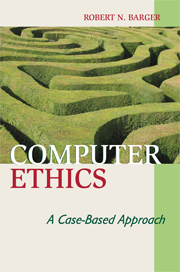Book contents
- Frontmatter
- Contents
- Preface
- Acknowledgments
- 1 Introduction
- 2 The Computer as a Humanizing Agent
- 3 Philosophic Belief Systems
- 4 A Philosophic Inventory
- 5 The Possibility of a Unifying Ethical Theory
- 6 The Ethical Decision-Making Process
- 7 Psychology and Computer Ethics
- 8 The Computing Field as a Profession
- 9 Computer-Related Codes of Ethics
- 10 Computer Ethics and International Development
- 11 Robotics and Ethics
- 12 Theft and Piracy Concerns
- 13 Cases Concerning Theft and Piracy
- 14 Privacy Concerns
- 15 Cases Concerning Privacy
- 16 Power Concerns
- 17 Cases Concerning Power
- 18 A Miscellaneous Collection of Cases
- 19 Parasitic Computing Case
- Appendix: Topics for Presentations, Discussions, and Papers
- Notes
- Selected Bibliography
- Index
18 - A Miscellaneous Collection of Cases
Published online by Cambridge University Press: 05 June 2012
- Frontmatter
- Contents
- Preface
- Acknowledgments
- 1 Introduction
- 2 The Computer as a Humanizing Agent
- 3 Philosophic Belief Systems
- 4 A Philosophic Inventory
- 5 The Possibility of a Unifying Ethical Theory
- 6 The Ethical Decision-Making Process
- 7 Psychology and Computer Ethics
- 8 The Computing Field as a Profession
- 9 Computer-Related Codes of Ethics
- 10 Computer Ethics and International Development
- 11 Robotics and Ethics
- 12 Theft and Piracy Concerns
- 13 Cases Concerning Theft and Piracy
- 14 Privacy Concerns
- 15 Cases Concerning Privacy
- 16 Power Concerns
- 17 Cases Concerning Power
- 18 A Miscellaneous Collection of Cases
- 19 Parasitic Computing Case
- Appendix: Topics for Presentations, Discussions, and Papers
- Notes
- Selected Bibliography
- Index
Summary
Mail Inspection Case
(© 1996 by John Halleck, used with permission)
Due to hardware problems, the mail to your site has to be remailed. (This involves checking each letter in the dead letter queue, checking to see to whom it should have been sent, and running a program to put it into the user's mailbox.) While doing this you end up seeing the contents of several messages. What should you do (if anything) in the following cases?
A message seems to be bragging about getting away with some fraud.
A message is giving information you know to be false about someone you know.
A message is telling another user false information about you.
A message seems to be setting up a drug deal.
A message that gives you a personal advantage.
Fake Sale Case
(© 1996 by John Halleck, used with permission)
You are asked to write a program to print tags for a sale. Your boss asks you to put out tags that have a price sufficiently high that a 10% discount marked on it brings it back to the original price. Do you do this?
Numerically Unstable Case
(© 1996 by John Halleck, used with permission)
A user comes by with a question about running his/her program on your machine. You notice that the methods that the program employs are numerically unstable (i.e., the answers have lots of digits, but only the first is significant [i.e., correct]). The user claims that his/her thesis depends on the first three digits of the answer.
- Type
- Chapter
- Information
- Computer EthicsA Case-based Approach, pp. 216 - 218Publisher: Cambridge University PressPrint publication year: 2008



